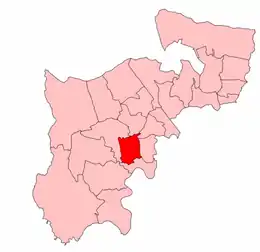Ealing East (UK Parliament constituency)
Ealing East was one of two and a minority of a third constituency covering the Municipal Borough of Ealing in Middlesex, 1945 – 1950. It included the town centre and in terms of local government content became, after its abolition, part of west London in 1965 at which time the borough expanded further to the east and west.
| Ealing East | |
|---|---|
| Former Borough constituency for the House of Commons | |
| 1945–1950 | |
| Number of members | one |
| Replaced by | Ealing South |
| Created from | Ealing |
Its voters returned one member (MP) to the House of Commons of the UK Parliament using the first past the post system.
Its single election was the general election of 1945, a landslide for Clement Attlee leading the Labour Party, at which the seat de facto re-elected (i.e. as incumbent) Frank Sanderson, a Conservative who had represented the seat's main forebear, Ealing.
History

The constituency was created for the 1945 general election, and abolished for the 1950 general election. The Municipal Borough of Ealing was then represented by the new Ealing North and Ealing South constituencies save for Hanwell which remained throughout in the Southall seat to the west, created in 1945.
Boundaries
The six Municipal Borough of Ealing wards: Castlebar, Drayton, Grange Grosvenor, Lammas, Manor, and Mount Park.
Members of Parliament
| Election | Member | Party | |
|---|---|---|---|
| 1945 | Sir Frank Sanderson, Bt. | Conservative | |
| 1950 | constituency abolished in name only, see Ealing South | ||
Election result
| Party | Candidate | Votes | % | ±% | |
|---|---|---|---|---|---|
| Conservative | Frank Sanderson | 22,916 | 47.83 | ||
| Labour | David John Johnston | 18,619 | 38.86 | ||
| Liberal | Harold William Foster | 6,377 | 13.31 | ||
| Majority | 4,297 | 8.97 | |||
| Turnout | 47,912 | 73.16 | |||
| Conservative win (new seat) | |||||
- for results of 1950–1970 elections see Ealing South